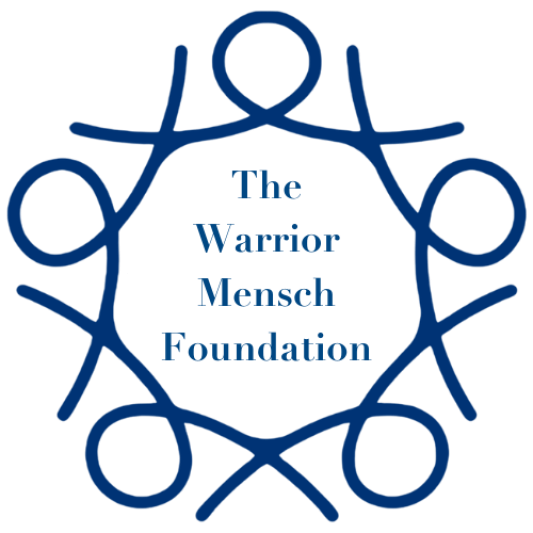
The Warrior Mensch Foundation, in memory of Marc Becker z”l, has generously provided free hereditary genetic testing kits to adults attending the High Holiday services at Park Avenue Synagogue.
This webinar focuses on genetic testing and understanding your hereditary cancer risk. Hosted by Basser Center for BRCA executive director Susan M. Domchek, MD, this webinar includes a panel with Elisa R. Port, MD, FACS of Mount Sinai Health System and Kenneth Offit, MD, MPH of Memorial Sloan Kettering Cancer Center.
Watch Now
The Color Genomics genetic test will be performed on a saliva sample. Inside your bag provided by the Warrior Mensch Foundation, you will find a Color Genomics saliva specimen collection kit. Please include the organization name "Synagogue Outreach - Warrior Mensch Foundation" while registering your kit.
Activate Your Kit Now
Who Should Consider Genetic Testing?
Women and men of Ashkenazi Jewish ancestry are at an elevated risk for carrying a BRCA1 or BRCA2 mutation. 1 in 40 individuals of Ashkenazi Jewish (Central or Eastern European) ancestry carry a BRCA gene mutation (otherwise known as a pathogenic variant). This is 5x higher than the general population. BRCA mutations increase an individual's risk of developing certain cancers, including breast (male or female), ovarian, prostate, and pancreatic. BRCA gene mutations can be passed on to children by either women or men. To know if you have inherited a BRCA gene mutation or other cancer risk gene mutation, genetic testing is needed.
Women and men of Ashkenazi Jewish ancestry at highest risk for carrying a BRCA mutation include those with:
- Breast cancer at age 65 or younger
- Triple negative breast cancer at any age
- Ovarian or fallopian tube cancer at any age
- More than one breast cancer diagnosis
- Male breast cancer
- Pancreatic cancer
- Metastatic prostate cancer
- A relative with a known mutation in a cancer risk gene
- A breast, ovarian, pancreatic, or high grade prostate cancer diagnosis in more than one individuals on the same side of the family
Individuals who had genetic testing over 10 years ago should consider meeting with a genetic counselor to determine if they are candidates for updated testing. If you have previously tested positive for carrying a BRCA mutation, contact your genetics provider to review your prior testing and what, if any, benefits there would be for additional testing. Learn more.
Why Should I Consider Genetic Testing?
Some benefits of genetic testing include:
- Enhanced screening for early detection
- Discussing surgical options to reduce cancer risk
- Understanding medication options to reduce cancer risk, such as chemoprevention, which is taking a medicine shown to lower the chances of developing cancer.
- Discussing family planning and reproductive considerations
What Are Some Possible Genetic Test Results?
Genetic test results can be:
- Positive - a mutation is detected that increases cancer risk.
- Negative - no mutation is detected. The interpretation of this result is crucial for understanding whether increased cancer risk is present or not. You can still have increased cancer risk with a negative result.
- Variant of Uncertain Significance (VUS) - a gene change is detected but it is currently unknown whether the change increases cancer risk or not.
Learn more about each result here.
What Are Other Genes Associated with Inherited Cancer Risks?
The BRCA1 and BRCA2 genes are not the only genes linked to increased cancer risks when a mutation is present. Genetic testing may include evaluation for mutations in other genes as well. This is called "multigene panel testing". The hereditary cancer testing through Color Genomics, for example, evaluates for mutations in 29 genes. For more detailed information on hereditary cancer genes, click here.
Ashkenazi Jewish Founder Mutations
While we have focused on the BRCA1 and BRCA2 gene mutations more often seen in those of Ashkenazi Jewish or Eastern European descent, there are other cancer risk genes besides BRCA1 and BRCA2 which have founder mutations specific to the Ashkenazi Jewish population. We have provided two examples below:
How Do I Begin Genetic Testing?
There are several ways for you to access genetic testing, including an in-person or telehealth appointment with a genetic counselor, your primary care provider, gynecologist, or direct to consumer options.
Option 1: In-Person or Virtual Genetic Testing and Counseling Appointment
Cancer risk evaluation starts with meeting with a genetics specialist to estimate your personal risk for different cancers by reviewing your personal and family history of cancer, and sometimes undergoing genetic testing. If you meet with a genetic counselor or a healthcare provider, genetic testing might be individually personalized based on the details of your family history.
To speak to a genetic counselor or an expert in cancer genetics in your area, you can search the National Society of Genetic Counselors’ (NSGC) Find a Genetic Counselor tool. To find an NCI-Designated Cancer Center near you and to learn more about each center's specific research capabilities and programs, including clinical cancer genetics programs, visit the National Cancer Institute.
You can contact your local institutions to request an appointment. Some options include:
- Connecticut
- New Jersey
- New York
- Pennsylvania
Option 2: Speak with Your Primary Care Provider or Gynecologist
Many Primary Care Providers and Gynecologists are able to order genetic testing directly. Reach out to your provider to ask about their protocols for offering testing.
Option 3: Color Genomics Testing Kit
The bag provided by the Warrior Mensch Foundation includes a free hereditary genetic testing kit from Color Genomics. These testing kits not only analyze the BRCA genes, but also analyze an additional 27 genes associated with inherited cancer risks. See details of these additional genes on the Color Genomics website here. If you have any questions regarding your testing kit, please contact Color Genomics.
I Want to Get Started with Color Genomics. How Do I Use My Testing Kit?
The Color Genomics genetic test will be performed on a saliva sample. Inside your bag, you will find a Color Genomics saliva specimen collection kit. Detailed information about the specimen collection kit, instructions, test results, and next steps can be found on the Color Genomics website here.
Please include the organization name "Synagogue Outreach - Warrior Mensch Foundation" while registering your kit.
Privacy and Protections for Genetic Test Results
The federal Genetic Information Non-discrimination Act (GINA) provides some protections against employment and health insurance discrimination based on genetic information but does not cover life, long-term care or disability insurance. Further, the Affordable Care Act (ACA) protects against health insurance denial or premium increase based on pre-existing conditions.
Resources
Contact Color Genomics
If you have any questions regarding your testing kit, how to use your testing kit or genetic test results please contact Color Genomics.
Find a Genetic Counselor in Your Area
To find a genetic counselor in your area, visit the National Society of Genetic Counselors or contact your local academic medical center.
Find an NCI-Designated Cancer Center in Your Area
To find an NCI-Designated Cancer Center near you and to learn more about each center's specific research capabilities and programs, including clinical cancer genetics programs, visit the National Cancer Institute. In addition, many teaching hospitals and larger community hospitals have clinical genetics programs.
Schedule an Appointment at the Basser Center for BRCA
To schedule an appointment for genetic risk evaluation or management of hereditary cancer risks with the Basser Center, click here.
Join the Basser Center for BRCA's Research Registry
We are dedicated to advancing genetics research through clinical trials so that BRCA mutation carriers can live longer, healthier lives. We currently maintain one of the world’s largest research registries of samples from participants with a known or suspected genetic risk of cancer.
Share Our Hereditary Cancer Risk Assessment Quiz with a Friend
Share our 5-minute risk factor quiz to learn more about your family's health history.
Follow the Basser Center!
Stay up-to-date on the latest in BRCA news and resources by joining our monthly e-newsletter, the BRCAbeat, or by following us on Instagram, Facebook, X, YouTube and LinkedIn.

